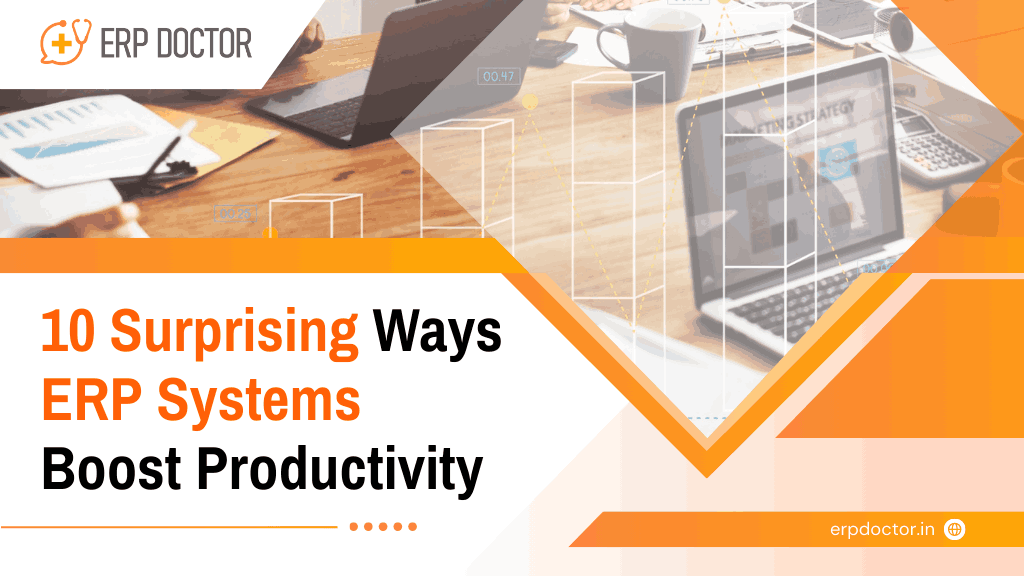
10 Surprising Ways ERP Systems Boost Productivity

10 ERP Strategies That Will Make Your Team More Productive
Picture a world where your business operates smoothly, every department is in sync, and productivity levels soar without the usual headaches. It sounds like a dream, but with ERP (Enterprise Resource Planning) software, this can become your reality. ERP systems not only optimize business operations but also unlock hidden productivity gains that often go unnoticed. Let’s explore 10 surprising ways ERP software can boost your productivity and take your business to the next level.
1. Unlocking Cross-Departmental Visibility
One of the biggest advantages of ERP software is how it connects different departments, providing visibility across the organization. When sales, finance, and inventory teams can all view each other’s data in real-time, coordination improves, errors decrease, and decisions are made faster. The result? A unified approach that boosts productivity at every level.
2. ERP Systems Simplify Workflow Automation
While most people know that ERP systems automate routine tasks, what might surprise you is how ERP can optimize entire workflows. For example, an ERP solution can connect the procurement process directly with inventory management, ensuring that when stock is low, orders are automatically placed. These process automations free up valuable time for employees to focus on more strategic tasks, leading to higher overall productivity.
3. Boosting Collaboration Through Shared Dashboards
Many ERP systems come equipped with customizable dashboards that provide key performance indicators (KPIs) for all departments in one shared space. This shared access not only keeps everyone updated on progress but also fosters accountability. Employees can track their own progress and understand how their work contributes to larger business goals, motivating them to stay on track and be more productive.
4. Faster Product Development Cycles
ERP systems help speed up the product development process by providing comprehensive data on customer preferences, market trends, and raw materials availability. Having all this information at your fingertips accelerates decision-making, cuts down on redundancies, and allows teams to bring products to market faster, all of which contribute to enhanced productivity.
5. Reducing Operational Bottlenecks
In many businesses, bottlenecks in production or processes can be major productivity drains. ERP systems help identify and eliminate these bottlenecks by offering predictive analytics, real-time reporting, and better resource allocation. Whether it’s an inventory issue or a delay in shipping, ERP systems help businesses address problems before they escalate, ensuring smoother operations.
6. Streamlining Employee Onboarding and Training
Employee onboarding and training can be time-consuming and inconsistent in many organizations. With ERP systems, businesses can create centralized training modules, performance tracking, and employee manuals. This reduces the need for repetitive training sessions and ensures that employees are up to speed quickly, improving productivity from day one.
7. ERP Systems for Real-Time Resource Allocation
ERP systems don’t just manage inventory and finance – they can also track human resources. By offering real-time visibility into employee schedules and workload, an ERP system can ensure that the right people are assigned to the right tasks at the right time. This dynamic resource management helps prevent downtime and allows for quicker responses to unexpected demands, driving productivity.
8. Better Customer Insights for Smarter Sales Strategies
An ERP solution integrated with CRM tools gives businesses deeper insights into customer behavior, preferences, and purchase history. Armed with this information, sales teams can craft more targeted strategies, focus on high-value customers, and close deals faster. With smarter strategies, businesses see better results in less time, boosting overall sales productivity.
9. Predicting Future Demand with Data Analytics
ERP systems are equipped with advanced data analytics tools that help businesses predict future demand with greater accuracy. By analyzing past trends, customer behavior, and seasonal patterns, an ERP system can forecast demand and help businesses optimize inventory levels, production schedules, and staffing. This proactive approach reduces waste and increases productivity by ensuring resources are available when needed most.
10. Reducing Downtime with Predictive Maintenance
For businesses that rely on equipment or machinery, downtime can be a major productivity killer. ERP systems, when integrated with IoT sensors, can predict when equipment will require maintenance before it breaks down. By addressing maintenance needs proactively, businesses can avoid costly delays and keep operations running smoothly, enhancing productivity.
FAQs About ERP Systems and Productivity
1. How does an ERP system integrate with other software in the business?
ERP integration links your ERP software with other systems, such as CRM, HR, or project management tools. This connection ensures that data flows seamlessly across platforms, eliminating the need for manual data entry and providing a single source of truth for all departments, ultimately increasing efficiency and productivity.
2. Will an ERP system improve my team’s time management?
Yes! By automating routine tasks and providing real-time insights, ERP systems help your team focus on what matters most. With less time spent on manual processes, employees can devote more time to higher-value activities that drive the business forward, improving overall time management.
3. Can ERP systems support remote teams?
Definitely! Cloud-based ERP solutions allow employees to access the system from anywhere with an internet connection. Whether your team works from home, across different locations, or in the field, they can stay productive and collaborate effectively.
4. How long does it take to see productivity improvements after ERP implementation?
The timeline varies depending on the complexity of your business and the ERP system. However, many businesses start seeing noticeable improvements in productivity within a few months of implementation. As employees become familiar with the system, processes become more streamlined, and productivity increases.
5. What are the main costs associated with ERP software?
While ERP systems come with an initial investment (including software purchase, customization, and implementation), the long-term benefits, such as reduced inefficiencies, time savings, and enhanced productivity, often outweigh the costs. When implemented effectively, ERP systems contribute to greater profitability and improved operational performance.
By implementing an ERP system, you’re not just upgrading your business software – you’re enhancing your entire workflow and empowering your team to achieve more. From predictive analytics to streamlined resource management, ERP software unlocks productivity in ways you might not have imagined. Don’t miss out on the opportunity to supercharge your operations and take your business to the next level!
Ready to boost productivity with ERP? Implement ERP systems now and transform your business! Visit erpdoctor.in to get started!
Looking for expert guidance? Complete the form below, and we’ll get in touch with you shortly!







